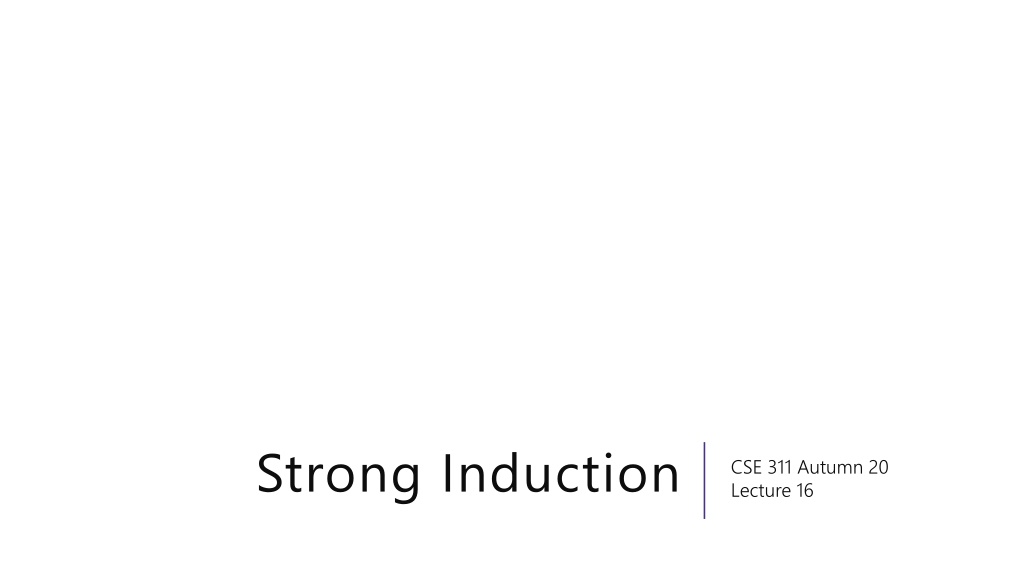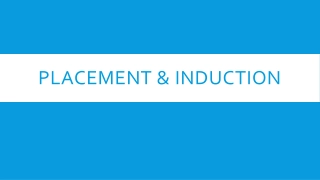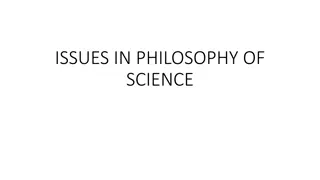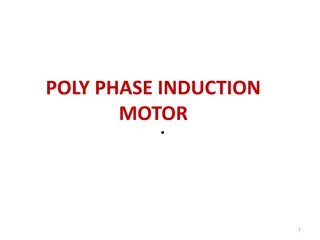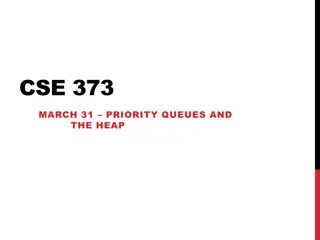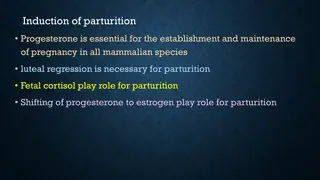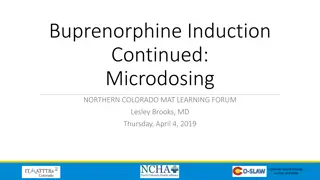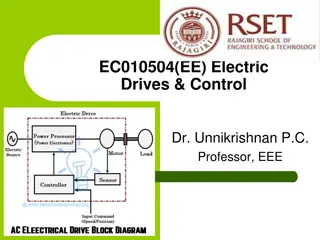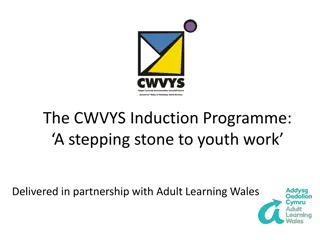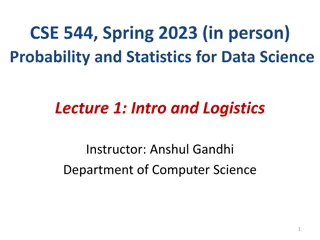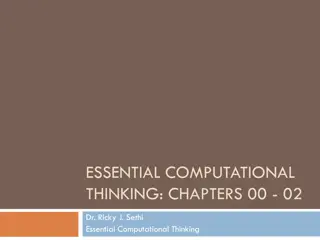Exploring Strong Induction in Computer Science: CSE 311 Lecture Insights
Delve into the realm of strong induction with a focus on computational concepts from CSE 311. Unveil the principles behind recursion, making induction proofs comprehensible, and the foundational Principle of Induction. Discover how to navigate complex algorithms and conquer challenges in the world of Computer Science.
Download Presentation

Please find below an Image/Link to download the presentation.
The content on the website is provided AS IS for your information and personal use only. It may not be sold, licensed, or shared on other websites without obtaining consent from the author. Download presentation by click this link. If you encounter any issues during the download, it is possible that the publisher has removed the file from their server.
E N D
Presentation Transcript
Strong Induction CSE 311 Autumn 20 Lecture 16
Announcements Hey, things are kinda crazy If news is making it infeasible to do your work, send an email to Robbie/make a private post on Ed; we can talk about what to do. In general, please talk to us. If you re struggling (with personal issues or just because the course is moving quickly) we can find ways to help, but there s only so much we can do without you reaching out first.
Gumball Says everything will be ok.
How do we know recursion works? //Assume i is a nonnegative integer //returns 2^i. public int CalculatesTwoToTheI(int i){ if(i == 0) return 1; else return 2*CaclulatesTwoToTheI(i-1); } Why does CalculatesTwoToTheI(4) calculate 2^4? Convince the other people in your room
Making Induction Proofs Pretty Let ?(?) be CalculatesTwoToTheI(i) returns 2?. Base Case Base Case (? = 0) Note that if the input ? is 0, then the if-statement evaluates to true, and 1 = 2^0 is returned, so ?(0) is true. Inductive Hypothesis Inductive Hypothesis: Suppose ?(?) holds for an arbitrary ? 0. Inductive Step Inductive Step: Since ? 0,? 1, so the code goes to the recursive case. We will return 2 CalculatesTwoToTheI(k). By Inductive Hypothesis, CalculatesTwoToTheI(k)= 2?. Thus we return 2 2?= 2?+1. So ?(? + 1) holds. Therefore ?(?) holds for all ? 0 by the principle of induction.
Making Induction Proofs Pretty All of our induction proofs will come in 5 easy(?) steps! 1. Define ?(?). State that your proof is by induction on ?. 2. Base Case: Show ?(0) i.e. show the base case 3. Inductive Hypothesis: Suppose ?(?) for an arbitrary ?. 4. Inductive Step: Show ? ? + 1 (i.e. get ? ? ?(? + 1)) 5. Conclude by saying ? ? is true for all ? by the principle of induction.
Some Other Notes Always state where you use the inductive hypothesis when you re using it in the inductive step. It s usually the key step, and the reader really needs to focus on it. Be careful about what values you re assuming the Inductive Hypothesis for the smallest possible value of ? should assume the base case but nothing more.
The Principle of Induction (formally) ? 0 ; ?(? ? ? ? + 1 ) Principle of Induction ?(? ? ) Informally: if you knock over one domino, and every domino knocks over the next one, then all your dominoes fell over.
More Induction Induction doesn t only Show that ?=0 only work for code! 2?= 1 + 2 + 4 + + 2?= 2?+1 1. ?
More Induction Induction doesn t only Show that ?=0 Let ? ? = ?=0 We show ?(?) holds for all ? by induction on ?. Base Case ( ) Inductive Hypothesis: Inductive Step: only work for code! 2?= 1 + 2 + 4 + + 2?= 2?+1 1. 2?=2?+1 1. ? ? ?(?) holds for all ? 0 by the principle of induction.
More Induction Induction doesn t only Show that ?=0 Let ? ? = ?=0 We show ?(?) holds for all ? by induction on ?. Base Case (? = 0) ?=0 2?= 1 = 2 1 = 20+1 1. Inductive Hypothesis: Suppose ?(?) holds for an arbitrary ? 0. Inductive Step: We show ?(? + 1). Consider the summation ?=0 2k+1+ ?=0 2?= 2?+1+ 2?+1 1, where the last step is by IH. Simplifying, we get: ?=0 2?+1 +1 1. ?(?) holds for all ? 0 by the principle of induction. only work for code! 2?= 1 + 2 + 4 + + 2?= 2?+1 1. 2?=2?+1 1. ? ? 0 ?+12?= ? ?+12?= 2?+1+ 2?+1 1 = 2 2?+1 1 =
Lets Try Another Induction Proof Let ? ? = 2 if ? = 2 if ? > 2 ?(? 1)2+ 3? ? 1 Prove ?(?) is even for all ? 2 by induction on ?. Let s just set this one up, we ll leave the individual pieces as exercises.
Setup Let ?(?)be ?(?)is even. HEY WAIT -- ?(0)isn t true ?(0)isn t even defined! We can move the starting line Change the base case, and then update the IH to have the smallest value of ? assume just the base case.
Setup Let ?(?)be ?(?)is even. We show ? ? for all ? 2 by induction on ?. Base Case Base Case ( (? = ?) ): : ? ? = 2 by definition. 2 is even, so we have ?(2). Inductive Hypothesis: Inductive Hypothesis: Suppose ?(?) holds for an arbitrary k 2. Inductive Step: Inductive Step: We show ?(? + 1). . Consider ?(? + 1). By definition of ? ,? ? + 1 = ?(?)2+ 3? ? . By inductive hypothesis, ?(?) is even, so it equals 2? for some integer ?. Plugging in we have: ? ? + 1 = 2?2+ 3 2? = 2 2?2+ 2 3? = 2(2?2+ 3?). Since ? is an integer, 2?2+ 3? is also an integer, and ?(? + 1) is even. Therefore, ?(?) holds for all ? 2 by the principle of induction.
Making Induction Proofs Pretty All of our induction proofs will come in 5 easy(?) steps! 1. Define ?(?). State that your proof is by induction on ?. 2. Base Case: Show ?(?) i.e. show the base case 3. Inductive Hypothesis: Suppose ?(?) for an arbitrary ? ?. 4. Inductive Step: Show ? ? + 1 (i.e. get ? ? ?(? + 1)) 5. Conclude by saying ? ? is true for all ? ? by the principle of induction.
Lets Try Another Induction Proof Fundamental Theorem of Arithmetic Every positive integer greater than 1 has a unique prime factorization. Uniqueness is hard. Let s just show existence. I.e. Claim: Every positive integer greater than 1 can be written as a product of primes.
Induction on Primes. Let ?(?)be ?can be written as a product of primes. We show ?(?) for all ? 2 by induction on ?. Base Case ( Base Case (? = ?): ): 2 is a product of just itself. Since 2 is prime, it is written as a product of primes. Inductive Hypothesis: Inductive Hypothesis: Suppose ?(?) holds for an arbitrary integer ? 2. Inductive Step: Inductive Step: Case 1, ? + 1 is prime: then ? + 1 is automatically written as a product of primes. Case 2, ? + 1 is composite: Therefore ?(? + 1). ?(?) holds for all ? 2 by the principle of induction.
Were Stuck We can divide ? + 1 up into smaller pieces (say ?,? such that ?? = ? + 1 with 2 ? < ? + 1 and 2 ? < ? + 1 Is ?(?) true? Is ?(?) true? I mean it would be But in the inductive step we don t have it Let s add it to our inductive hypothesis.
Induction on Primes Let ?(?)be ?can be written as a product of primes. We show ?(?) for all ? 2 by induction on ?. Base Case ( Base Case (? = ?): ): 2 is a product of just itself. Since 2 is prime, it is written as a product of primes. Inductive Hypothesis: Inductive Hypothesis: Inductive Step: Inductive Step: Case 1, ? + 1 is prime: then ? + 1 is automatically written as a product of primes. Case 2, ? + 1 is composite: Therefore ?(? + 1). ?(?) holds for all ? 2 by the principle of induction.
Induction on Primes Let ?(?)be ?can be written as a product of primes. We show ?(?) for all ? 2 by induction on ?. Base Case ( Base Case (? = ?): ): 2 is a product of just itself. Since 2 is prime, it is written as a product of primes. Inductive Hypothesis: Inductive Hypothesis: Suppose ? 2 , ,? ? hold for an arbitrary integer ? 2. Inductive Step: Inductive Step: Case 1, ? + 1 is prime: then ? + 1 is automatically written as a product of primes. Case 2, ? + 1 is composite: We can write ? + 1 = ?? for ?,? nontrivial divisors (i.e. 2 ? < ? + 1 and 2 ? < ? + 1). By inductive hypothesis, we can write ? as a product of primes ?1 ?? and ? as a product of primes ?1 ? . Multiplying these representations, ? + 1 = ?1 ?? ?1 ? , which is a product of primes. Therefore ?(? + 1). ?(?) holds for all ? 2 by the principle of induction.
Strong Induction That hypothesis where we assume ? base case , ,?(?) instead of just ?(?) is called a strong inductive hypothesis. Strong induction is the same fundamental idea as weak ( regular ) induction. ?(0) is true. And ? 0 ?(1), so ? 1 . And ? 1 ?(2), so ? 2 . And ? 2 ?(3), so ? 3 . And ? 3 ?(4), so ? 4 . ?(0) is true. And ? 0 ?(1), so ? 1 . And [P 0 ? 1 ] ?(2), so ? 2 . And [P 0 ? 2 ] ?(3), so ? 3 . And[P 0 ? 3 ] ?(4), so ? 4 .
Making Induction Proofs Pretty All of our strong 1. Define ?(?). State that your proof is by induction on ?. 2. Base Case: Show ?(?) i.e. show the base case 3. Inductive Hypothesis: Suppose P b ?(?) for an arbitrary ? ?. 4. Inductive Step: Show ? ? + 1 (i.e. get [P b ?(?)] ?(? + 1)) 5. Conclude by saying ? ? is true for all ? ? by the principle of induction. strong induction proofs will come in 5 easy(?) steps!
Strong Induction vs. Weak Induction Think of strong induction as my recursive call might be on LOTS of smaller values (like mergesort you cut your array in half) Think of weak induction as my recursive call is always on one step smaller. Practical advice: A strong hypothesis isn t wrong when you only need a weak one (but a weak one is wrong when you need a strong one). Some people just always write strong hypotheses. But it s easier to typo a strong hypothesis. Robbie leaves a blank spot where the IH is, and fills it in after the step.
Practical Advice How many base cases do you need? Always at least one. If you re analyzing recursive code or a recursive function, at least one for each base case of the code/function. If you always go back ? steps, at least ? consecutive base cases. Enough to make sure every case is handled.
Lets Try Another! Stamp Collecting I have 4 cent stamps and 5 cent stamps (as many as I want of each). Prove that I can make exactly ? cents worth of stamps for all ? 12. Try for a few values. Then think how would the inductive step go?
Stamp Collection (attempt) Define ?(?) I can make ? cents of stamps with just 4 and 5 cent stamps. We prove ?(?) is true for all ? 12 by induction on ?. Base Case: 12 cents can be made with three 4 cent stamps. Inductive Hypothesis Suppose [maybe some other stuff and] ?(?), for an arbitrary ? 12. Inductive Step: We want to make ? + 1 cents of stamps. By IH we can make ? 3 cents exactly with stamps. Adding another 4 cent stamp gives exactly ? + 1 cents.
Stamp Collection Is the proof right? How do we know ?(13) We re not the base case, so our inductive hypothesis assumes ?(12), and then we say if ? 9 then ?(13). Wait a second . If you go back ? steps every time, you need ? base cases. Or else the first few values aren t proven.
Stamp Collection Define ?(?) I can make ? cents of stamps with just 4 and 5 cent stamps. We prove ?(?) is true for all ? 12 by induction on ?. Base Case: 12 cents can be made with three 4 cent stamps. 13 cents can be made with two 4 cent stamps and one 5 cent stamp. 14 cents can be made with one 4 cent stamp and two 5 cent stamps. 15 cents can be made with three 5 cent stamps. Inductive Hypothesis Suppose P 12 ? 13 ?(?), for an arbitrary ? 15. Inductive Step: We want to make ? + 1 cents of stamps. By IH we can make ? 3 cents exactly with stamps. Adding another 4 cent stamp gives exactly ? + 1 cents.
A good last check After you ve finished writing an inductive proof, pause. If your inductive step always goes back ? steps, you need ? base cases (otherwise ? + 1will go back before the base cases you ve shown). And make sure your inductive hypothesis is strong enough. If your inductive step is going back a varying (unknown) number of steps, check the first few values above the base case, make sure your cases are really covered. And make sure your IH is strong.
Making Induction Proofs Pretty All of our induction proofs will come in 5 easy(?) steps! 1. Define ?(?). State that your proof is by induction on ?. 2. Base Cases: Show ? ????,? ????+1 ?(????) i.e. show the base cases 3. Inductive Hypothesis: Suppose ? ???? ? ????+ 1 ?(?) for an arbitrary ? ????. (The smallest value of ? assumes all nothing else) 4. Inductive Step: Show ? ? + 1 (i.e. get [P(b??? ? ? ] ?(? + 1)) 5. Conclude by saying ? ? is true for all ? ???? by the principle of induction. all bases cases, but
Stamp Collection, Done Wrong Define ?(?) I can make ? cents of stamps with just 4 and 5 cent stamps. We prove ?(?) is true for all ? 12 by induction on ?. Base Case: 12 cents can be made with three 4 cent stamps. Inductive Hypothesis Suppose ?(?), ? 12. Inductive Step: We want to make ? + 1 cents of stamps. By IH we can make ? cents exactly with stamps. Replace one of the 4 cent stamps with a 5 cent stamp. ?(?) holds for all ? by the principle of induction.
Stamp Collection, Done Wrong What if the starting point doesn t have any 4 cent stamps? Like, say, 15 cents = 5+5+5.
Even more practice I ve got a bunch of these 3 piece tiles. I want to fill a 2?x2? grid (? 1) with the pieces, except for a 1x1 spot in a corner.
Gridding Base Case: ? = 1 Inductive hypothesis: Suppose you can tile a 2?x2? grid, except for a corner. Inductive step: 2?+1x2?+1, divide into quarters. By IH can tile
